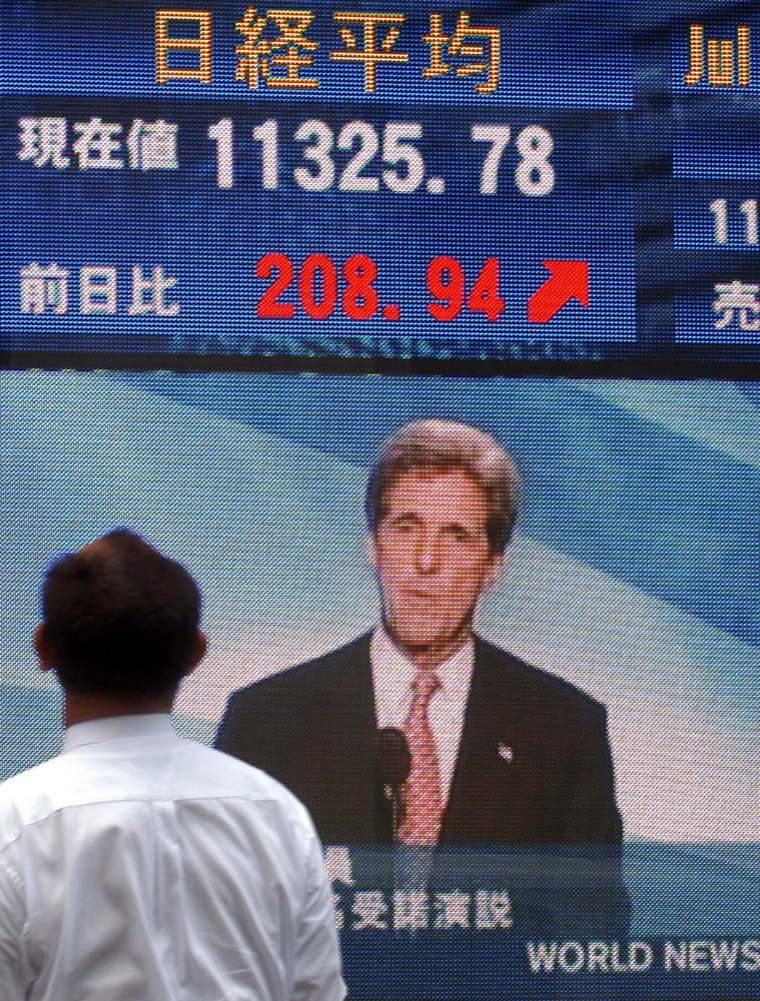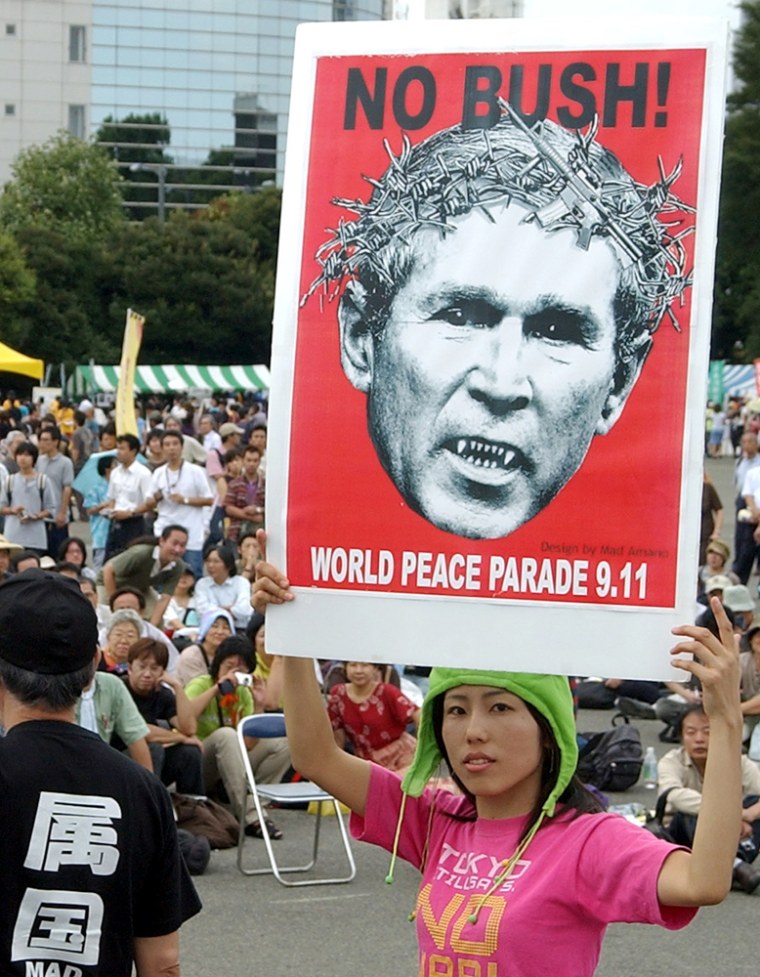As the U.S. presidential race enters the home stretch, dominant opinions across Asia remain sharply critical of the U.S. war in Iraq, and the polarizing issue seems to be responsible for the decided popularity of Senator John Kerry over President Bush among many from China to Japan.
But, regional issues – such as North Korea’s nuclear ambitions – are also shaping opinions. While not surprisingly, South Korean may have grown tired of Bush and the stalemate over North Korea, but what may be seem shocking are the indications that Pyongyang seems to favor the strong hand of Bush.
Still opinions remain neutral in other parts of Asia. Kerry and Bush may still be fighting the Vietnam War here, but over there, the war is long over and many Vietnamese seem ambivalent about Kerry’s anti-war stance.
Anti-Iraq war in China and Japan
"We don't like Bush," declared Hu Jia, a Chinese human rights activist. "Like other NGOs around the world, we don't like war with its unpredictable consequences on innocent victims, so we want Kerry to become president as he can bring about a more peaceable world," he added.

Hu was reflecting the overwhelming opinion in China against the U.S.-led invasion of Iraq. According to a recent global survey conducted by GlobeScan and the University of Maryland, some 52 percent of Chinese favor Kerry, with only 12 percent supporting Bush.
"Bush will probably win and I think that's dangerous," said Taiwanese Fan Shudan, a graduate student at Peking University. "I am against war.”
Even in Japan, a stalwart ally of the United States, only 23 percent of the public prefer Bush, with Kerry enjoying 43 percent of support.
"It is worrisome that there is a big gap between the atmosphere in the United States and views in the international community," lamented Japan's Asahi Shimbun, adding that "by bringing issues regarding Iraq to the fore, Kerry has opened an opportunity for people in the United States and the rest of the world to become closer in their thinking."
Philippines supportive of Bush war on terror
Only in the Philippines does Bush enjoy a clear-cut majority, with 57 percent against Kerry's 32 percent.
Substantial U.S. military assistance which has bolstered Manila's long-running war with local Islamist terrorist bands, coupled with Bush's state visit and the Philippines' designation as a "major non-NATO ally" last year – a designation only shared by Japan and Australia in the Asia-Pacific - may explain Bush's popularity there.
Although, the survey results may not reflect any shift in public mood following a row between Washington and Manila over the decision in late July to withdraw a small contingent of the Philippine military from Iraq to save a Filipino hostage.
But in the view of Nelson Navarro, a noted writer and political analyst, many Filipinos "feel that Bush went overboard in responding to 9/11 and, in effect, declared an open-ended war not against al-Qaeda, but against Muslims and minorities who do not approve of American high-handed policies in the Middle East and elsewhere in the Third World."
Regarding the Iraq war Navarro added, "it's Kerry, not Bush, who's capable of an honorable exit, Kerry and the Democrats come across as a bit more sensitive, if not less arrogant in dealing with the world out there who are not necessarily anti-American but demand to be treated as sovereign nations."
Neutral opinions in Vietnam
Opinions in India and Thailand, two strong U.S. allies in the war on terror, are almost evenly split, with an insignificant difference in Bush's favor.
After decades of pro-Pakistan policy, the U.S. has a warming relation with India as both pursue a common battle against terror, but Indian public attitudes remains ambivalent.
"To most Indians, Kerry and Bush are the same," observed Siddhartha Reddy, political analyst and columnist for Asian Age. "Most Indians want the United States to partner with India and other affected nations in a universal policy of fighting terrorism, without double-speak and double-do."
In Vietnam, the public attitude is likewise neutral, despite Kerry's credentials as an anti-war veteran.
"The two are basically the same," said a Vietnamese analyst who requested anonymity, adding that that Vietnam War was long over and Kerry's credentials are "not really very important, the important thing is that whoever becomes president will promote the common interests and good relations of Vietnam and the U.S."
In South Korea, resentment towards Bush
The most striking signal of resentment towards Bush's foreign policy comes from South Korea, a long-time U.S. ally, with President Roh Moo-hyun himself strongly articulating the attitudes shared by many South Koreans.
In Moscow last week, he virtually blamed the U.S. for the nuclear impasse and the refusal of North Korea to resume negotiations.
"For instance, the U.S. totally changed its North Korean policy after the last presidential elections, although they had nearly reached a conclusion over the problem under the Clinton administration," Roh was quoted as saying.
Roh has been critical of "negative" language such as President Bush's use of "tyrant" to describe Kim Jong-il, the North Korean leader.
Many South Koreans attribute the collapse of improving U.S.-North Korea relations in the final days of Clinton's presidency to President Bush's "axis of evil" policy enunciated in 2002.
Yoo Jay-kun, an influential leader of the ruling Uri Party and chairman of the parliament's defense committee, was more blunt, telling the Korea Herald recently that a Kerry presidency would be "better at solving the nuclear stand-off with Pyongyang through dialogue."
Pyongyang supportive of strong Bush leadership
There's a startling signal, however, that Pyongyang itself may be having a different calculation of the potential impact of the U.S. presidential elections, based on a recent interview with a North Korean international affairs analyst.
Kerry has called for direct talks to resolve the nuclear stalemate, a stance in line with North Korea's long-standing demand. But, according to the analyst who closely follows his government's foreign policy, Pyongyang does not necessarily prefer a Kerry presidency.
"We would like to deal with a strong leader," said the North Korean analyst who requested that he be not identified. "In this case, we would prefer Bush as he would have control of Congress, whereas if Kerry wins, he cannot control a Republican Congress," the analyst added.
"We would like to deal with a strong leader who has control of the legislature, so that whatever agreement we reach will enjoy strong political support," the analyst explained.
Fearing Iraq-style invasion, North Korea has been demanding a peace treaty with the United States, which needs congressional ratification, as part of a package of measures to resolve the nuclear conflict, and has balked at U.S. offers of "written security guarantee" which Pyongyang fears is not legally binding.
"The Americans are always saying that we should follow the so-called Libyan model," the analyst further said, referring to Libya's decision to unilaterally dismantle its nuclear program. "But the most important thing about the Libyan model is direct talks, direct secret talks, " he said, adding that "we hope there will be a change in Bush policy after he is re-elected."
North Korea has not come out with any official pronouncements that would more clearly indicate its attitude towards the U.S. elections, and the analyst's remarks are the closest indication of real-politic thinking in Pyongyang.
China- so far unscathed in presidential campaign
As the U.S. presidential campaign draws to a close, the strongest sigh of relief can be heard in China.
In a commentary for Global Times, Niu Xinchun, a scholar of international relations, noted that the "China issue" or the "China threat" has not figured prominently in the current elections campaign, in contrast with previous presidential election.
"In four years, Bush worsened relations with Europe, aggravated conflicts with Islamic countries and stirred up the dissatisfaction of many countries towards U.S. unilateralism…virtually demolishing its relations with nearly all the major powers, with U.S.-China relations as one of the 'few survivors,’" declared Niu.
"In the era of fighting terror, the Republicans don't want to damage relations with China…they cannot attack China to win votes," he added, citing recent top-level visits designed to "stabilize" relations before the elections.
"Personally I think Bush has more chance of winning, but the general framework of U.S.-China relations will remain unchanged, whoever becomes the president," said Professor Jin Canrong, expert of China-U.S. relations at People's University.
